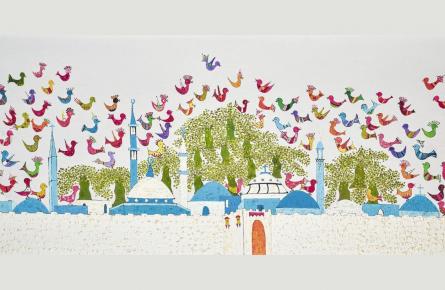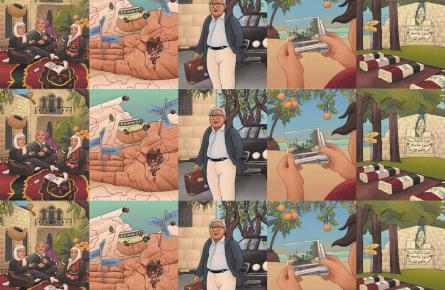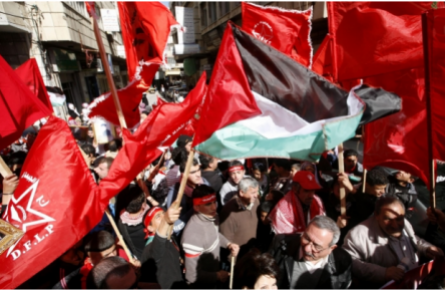Editor's Note: This article is part of the Press on Palestine series, an initiative by Palestine Square. It covers the month of March 2021. Press on Palestine highlights bias in mainstream American reporting on Palestinian affairs and the Arab-Israeli conflict.
Neither Prime Minister Benjamin Netanyahu’s coalition of far-right parties nor the equally volatile collection of anti-Netanyahu parties are able to form a government. After the fourth election in two years, Israeli President Reuven Rivlin has yet again given Netanyahu the first crack at forming a 61-seat majority coalition. Most observers believe that neither camp will be successful and a fifth election will likely be called.
American print media focused on whitewashing the characters that comprise Israeli politics, from supposed “moderates” to those who openly call for the ethnic cleansing of Palestinians. Once the election reached its inconclusive end, The New York Times, The Washington Post and The Wall Street Journal all latched onto a flimsy narrative: that Arab MK Mansour Abbas, leader of the small United Arab List party, was a potential kingmaker who held the cards necessary to break the deadlock. The reality is that if the United Arab List and its four MKs were to join either coalition, other Jewish parties would almost certainly withdraw from the coalition in response, rendering Abbas’s decision useless. The media pushed this narrative in an attempt to promote Israel’s sham democracy.
1. The New York Times – Mar. 17, 2021
As 4th Election Looms, Some Ask: Is Israel’s Democracy Broken?
New York Times Jerusalem bureau chief Patrick Kingsley concluded that Israel is a democracy “deep in dysfunction.” All of the blame, in Kingsley’s view, can be directed at Netanyahu, who is upending democratic norms in a reckless attempt to maintain his grip on power while under investigation for corruption. Kingsley lamented that Netanyahu’s political maneuvering has prevented the rise of “centrist” politicians like Benny Gantz and Yair Lapid, albeit without defining what “centrist” means in the context of Israeli politics.
In reality, there are no significant “centrist” politicians, parties, or blocs in Israel—there are only those who pay lip service to liberal norms and those who do not. The supposedly “centrist” Gantz is a former IDF chief whose 2019 campaign pitch included bragging about how many Palestinians were killed by the Israeli forces he commanded in the 2014 assault on Gaza. Lapid, who was recently profiled in the Times as a “voice for moderation” seeking to “preserve liberal democracy,” has previously stated his belief in the principle of “maximum Jews on maximum land with maximum security and minimum Palestinians.” These types of quotes will never be printed in the Times, however. They would hinder the paper’s attempt to present Israel as a robust democracy.
Kingsley also wrote that the latest Netanyahu coalition took the unprecedented step of including the extremist Otzma Yehudit party and its leader, Itamar Ben-Gvir. Although the Kahanist party openly calls for the expulsion of all Palestinians, Ben-Gvir was described in the article as an advocate of expelling Arabs “who are not loyal to Israel.”
2. The Washington Post – Mar. 25, 2021, and The Wall Street Journal – Mar. 3, 2021
An Islamist political party may hold the key to forming Israel’s next government
Only Netanyahu Can Go to Nazareth
A little-known Arab political figure has garnered an abrupt swell of media attention: United Arab List (“Ra’am” in Hebrew) leader Mansour Abbas. The Washington Post’s Steve Hendrix described Abbas’ “surprising star turn” as signaling “the possible softening of Israel’s long-standing taboo against Jewish parties partnering with Arab parties.” The New York Times concurred that Abbas is a “potential kingmaker,” while The Wall Street Journal added that the Arab MK “has shaken up Israeli politics.” The Journal also published an op-ed by former Israeli diplomat Shahar Azani, who pushed the narrative that “Netanyahu could make Arab Israelis the new kingmakers of Israeli politics.”
Nearly all of the numerous recent articles about Abbas admit that even if “Ra’am” were to commit itself to Netanyahu’s bloc, some of the prime minister’s coalition partners would more than likely withdraw in response before a government could be formed. So, why does the American press keep publishing article after article about Abbas?
Overhyping the relevance of Arab parties that choose to participate in Israeli elections serves the façade of Israeli democracy well. Before Abbas, it was Ayman Odeh that served as the media’s favorite Palestinian politician. Odeh, leader of the Knesset’s largest Arab bloc known as the “Joint List,” was introduced to Western audiences over the past year, including in a write-up in The New York Times that characterized him as “a charismatic lawyer whose eloquence and approachability make him a marked contrast with the stodgy autocrats in [Fatah] and the radical Islamists in [Hamas].”
However much the media wants to boost figures like Abbas and Odeh, the real story is that Israeli elections are receiving less interest from Palestinians with Israeli citizenship, not more. Arab electoral participation dropped from 65% in March 2020 to 46% in 2021.
While American media’s inordinate interest in Odeh and Abbas stems primarily from its desire to present Arab gains in the Knesset as proof that Israel is becoming more democratic with time, there is another point readers should take away from this coverage. The emphasis on these two reflects the fact that any Palestinian political leader, whether an ostensible leftist like Odeh or an Islamist like Abbas, is always welcome in American media so long as they are firmly committed to cooperation with Israel rather than resistance.




